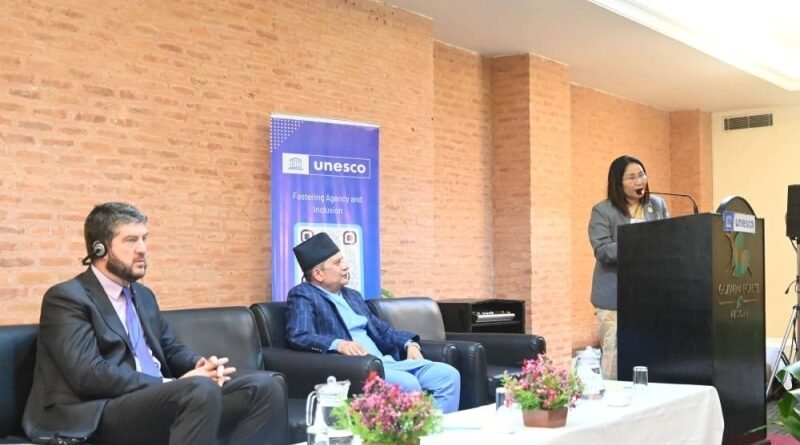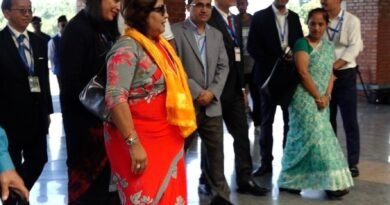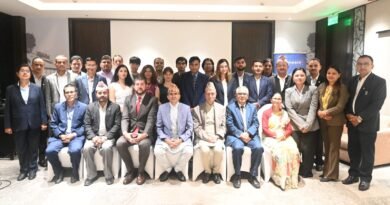UNESCO Forum highlights Human Rights-Centered Approaches and Global Best Practices
To address Nepal’s rapidly evolving media landscape and the growing significance of digital media, members of parliament, experts, policymakers, and regulators have convened for a workshop to explore tangible pathways and human-rights-centered approaches for the governance of digital media platforms in Nepal from 13-14 September. The workshop is organized by UNESCO in collaboration with the Federal Parliament of Nepal and Freedom Forum.
While digital platforms, specifically social media, have facilitated communication and access to information for the wider Nepali population, they have also raised concerns about content moderation, disinformation/misinformation, hate speech, and potential infringements on human rights, challenges which necessitate a discussion on the required regulatory frameworks for digital media platform governance.
Citing her own personal experiences with online hate speech, Hon. Indira Rana, Deputy Speaker of the House of Representatives, expressed that, “This workshop will provide our key stakeholders with the knowledge and guidance necessary to strengthen our systems, policies, and laws to protect the rights of Nepalis on digital platforms.”
The workshop referenced “Guidelines for the Governance of Digital Platforms” launched by UNESCO in 2023 which promotes freedom of expression and access to information while mitigating the risks associated with content that may need regulation under international human rights law. The guidelines emphasize the responsibilities of governments, platforms, intergovernmental organizations and civil society in establishing independent governance systems and minimizing the fragmentation of regulatory efforts globally.
“Discussion of this kind will play a crucial role in helping us establish pathways that uphold human rights standards while guiding the governance of digital platforms in Nepal,” said Hon. Manoj Duwadi, Commissioner of the National Human Rights Commission, emphasizing the urgent need for collective action.
The workshop provided a space and opportunity for multistakeholder dialogues, facilitating exchanges on the challenges and offering practical recommendations for governance of digital media platforms. The participatory approaches enabled participants to address the specific needs and requirements of Nepal’s local context. The discussions led to concrete recommendations and actionable steps for adapting global best practices to Nepal’s unique environment. These recommendations and roadmaps also complimented global efforts as well as regional good practices and case studies.
Along with parliamentarians, the workshop featured international experts including Daniel Wilson, Head of Child Online Safety, Department of Science, Innovation and Technology, UK; George Sarpong, Executive Secretary, Ghana’s National Media Commission; Sidra Jalil, Representative from TikTok; Malavika Rajkumar, IT for Change, India; and Marjorie Buchser from UNESCO.
“While the Guidelines don’t offer specific recommendations that can be easily picked up by regulators, they do help us ask the right questions and assist in helping provide a structured way to approach what is a highly complex policy issue, and strongly encourage us to maintain human rights and a human-centered approach foremost in mind when legislation and regulations are considered,” stated Michael Croft, UNESCO Representative to Nepal adding, “Nepal, with its tradition of open and democratic discourse, has the right attributes to be a proving ground for the Guidelines, a pilot demonstrating what they can mean in practice, and a champion in Asia for this approach.”
Building on the momentum from the previous interaction with parliamentarians and government representatives in March 2024, and incorporating additional key stakeholders, this workshop represents a significant step towards fostering a balanced, inclusive, and human rights-centered digital landscape for all Nepali.
The workshop has paved the way for developing regulatory approaches that respect human rights and address the unique challenges faced in Nepal. The collaborative efforts of parliamentarians, international experts, and local stakeholders have resulted in actionable recommendations that will not only guide Nepal’s digital platform governance but also contribute to global and regional efforts in this critical area.
This forum has been organized with a view to UNESCO’s ongoing collaboration with Member States worldwide to promote freedom of expression, access to information and the safety of journalists, supported by the Organization’s Multi-Donor Programme on Freedom of Expression and Safety of Journalists.




